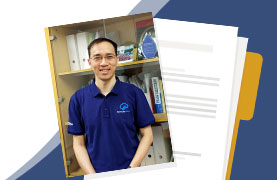Sheng Yang
Lab Information
Key Laboratory of Synthetic Biology, CAS
Research Area and Skills
Recognize this scientist’s Expertise for their contribution in your research
Metabolic Engineering 6 Molecular Biology Technology 3 Genome Editing 10 Fermentation 3 CRISPR / Cas9 10 CRISPR-associated transposase 0
- Post
- Publication
- Plasmid
- Following (0)
- Follower (33)
The pCas/pTargetF system is one of the most popular genomic editing systems in E. coli. According to data from MolecularCloud, Addgene and our laboratory, there were 723 and 615 usage records in total for pCas and pTargetF respectively. However, few users pointed out that this ...Learn More
- Like (4)
- Reply
-
Share
We are glad that so many people are interested in our recent research "Multicopy Chromosomal Integration Using CRISPR-Associated Transposases " which was published on ACS Synthetic Biology. Last week, I had a conversation with Lidan from MolecularCloud team and thanks ...Learn More
MulticopyChromosomal Integration Using CRISPR-Associated TransposasesControlling the copy number of gene expression cassettes is an important strategy to engineer bacterial cells into high-efficiency biocatalysts. Current strategies mostly use plasmid vectors, but multicopy ...Learn More
Qi Li, Francois M. Seys, Nigel P. Minton, Junjie Yang, Yu Jiang, Weihong Jiang, Sheng Yang*(2019)CRISPR-Cas9(D10A) nickase-assisted base editing in solvent producer Clostridium beijerinckii. Biotechnol Bioeng. Doi: 10.1002/bit.26949
He Huang, Xin Song, Sheng Yang*(2019) Development of a RecE/T-Assisted CRISPR-Cas9 Toolbox for Lactobacillus. Biotechnology journal. doi: 10.1002/biot.201800690.
Zhiqiang Wen, Ledesma-Amaro, Rodrigo; Jianping Lin*, Yu Jiang, Sheng Yang*(2019)Improved n-butanol production from Clostridium cellulovorans by integrated metabolic and evolutionary engineering. Appl Environ Microbiol. Doi: 10.1128/AEM.02560-18
Jing, X., Xie, B., Chen, L., Zhang, N., Jiang, Y., Qin, H., Wang, H., Hao, P., Yang, S., Li, X. (2018). Implementation of the CRISPR-Cas13a system in fission yeast and its re-purposing for precise RNA editing. Nucleic Acids Research.
Sun, B., Yang, J., Yang, S., Ye, R.D., Chen, D., Jiang, Y. (2018). A CRISPR-Cpf1-Assisted Non-Homologous End Joining Genome Editing System of Mycobacterium smegmatis. Biotechnology Journal, e1700588.
Sun, J., Wang, Q., Jiang, Y., Wen, Z., Yang, L., Wu, J., Yang, S. (2018). Genome editing and transcriptional repression in Pseudomonas putida KT2440 via the type II CRISPR system. Microbial Cell Factories, 17(41).

This guy has no following anyone.
Popular Cloud Scientists
About Us · User Accounts and Benefits · Privacy Policy · Management Center · FAQs
© 2025 MolecularCloud






